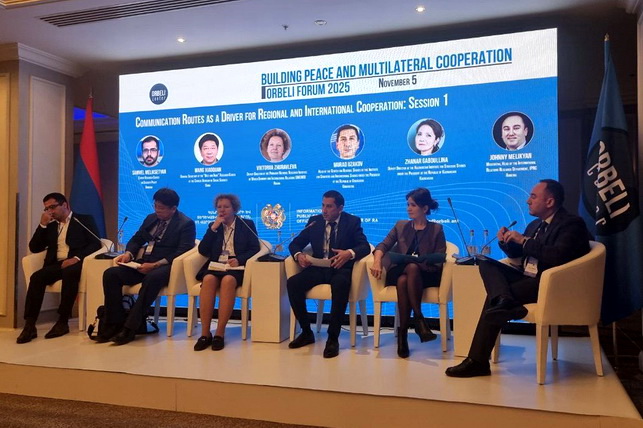
The Interconnectedness of Central Asia and the South Caucasus Holds Great Promise
The Interconnectedness of Central Asia and the South Caucasus Holds Great Promise
Tashkent, Uzbekistan (UzDaily.com) — The international forum “Orbeli Forum: Building Peace and Multilateral Cooperation” was recently held in Yerevan, organized by the Information and Public Relations Center under the Prime Minister’s Office of Armenia and the Orbeli Analytical Research Center.
The event brought together Armenian Prime Minister Nikol Pashinyan, Foreign Minister Ararat Mirzoyan, representatives of Armenian government agencies, and experts from leading think tanks of the United States, China, Russia, Türkiye, EU countries, the South Caucasus, Central and South Asia, and the Middle East, as well as members of the diplomatic corps. The forum gathered more than 200 politicians and experts from over 16 countries.
Discussions focused on peacebuilding, economic transformation in the South Caucasus, opportunities for regionalization, and prospects for developing and strengthening interregional connectivity with the EU, Central Asia, and South Asia.
Participants welcomed the efforts of South Caucasus countries to normalize interstate relations and the progress achieved in the peace process between Azerbaijan and Armenia, which signed a peace declaration in August this year.
Uzbekistan and the South Caucasus: Deepening Partnership
In the context of cooperation with the South Caucasus, special attention was given to prospects for interaction with Uzbekistan. According to Murad Uzakov, Head of the Center for Regional Studies at the Institute for Strategic and Interregional Studies (ISMI) under the President of Uzbekistan, Tashkent is steadily developing political and economic relations with all countries of the South Caucasus and is interested in expanding cooperation with the region as a whole.
Among the priority areas, the expert highlighted industrial cooperation, mutual investment, transport and communication corridors, and collaboration in agriculture, information technology, and tourism.
Uzakov emphasized that strengthening ties between Central Asia and the South Caucasus is a key factor for building lasting connectivity between the two regions and serves as a reliable foundation for regional security and sustainable development.
Central Asia and the South Caucasus: Potential and Prospects for Interregional Connectivity
Against the backdrop of transformations in the South Caucasus, participants paid particular attention to new opportunities for interregional cooperation with Central Asia.
According to the ISMI representative, the complex geopolitical situation and macroeconomic challenges make it necessary to strengthen regional cooperation and seek reliable formats for interregional interaction.
The expert noted that Central Asia has confidently entered a new stage of development — one of consolidation. The region is transforming from a mosaic of separate interests into a unified framework of cooperation.
Over the past eight years, the combined GDP of Central Asian countries has doubled, intra-regional trade has increased 4.5 times, the number of joint ventures more than fivefold, mutual investments nearly sixfold, and foreign direct investment inflows have grown by 40%.
Similar processes are unfolding in the South Caucasus. The growing commitment of its countries to collaboration creates opportunities for trade, energy, and transport cooperation.
These positive shifts lay the groundwork for building stronger connectivity between Central Asia and the South Caucasus. With their strategic location, human potential, natural resources, and energy reserves, the two regions possess enormous potential for accelerated development.
According to experts, enhancing interregional connectivity will help:
- strengthen self-sufficiency, competitiveness, and attractiveness;
- increase their geostrategic importance as linking hubs in the Eurasian space;
- accelerate diversification of external economic relations;
- develop transport and logistics networks, including key international routes;
- and boost integration among Central Asia, South Asia, and the South Caucasus.
Practical Steps Forward
Forum participants proposed creating an interregional expert dialogue to identify key areas of cooperation and explore the “Central Asia–South Caucasus” format.
It was noted that Central Asia is already actively engaged in 11 “CA+” formats with nearly 40 countries and two regional organizations, generating mutual economic benefits.
Overall, the outcomes of the forum demonstrated the South Caucasus countries’ growing commitment to peacebuilding and enhancing interregional connectivity.
Participants concluded that in an era of regionalization, shifting geopolitics, and restructuring of global economic relations, deepening cooperation with the South Caucasus holds significant promise for all parties and may become one of the key drivers in shaping a new, interconnected Eurasian space.